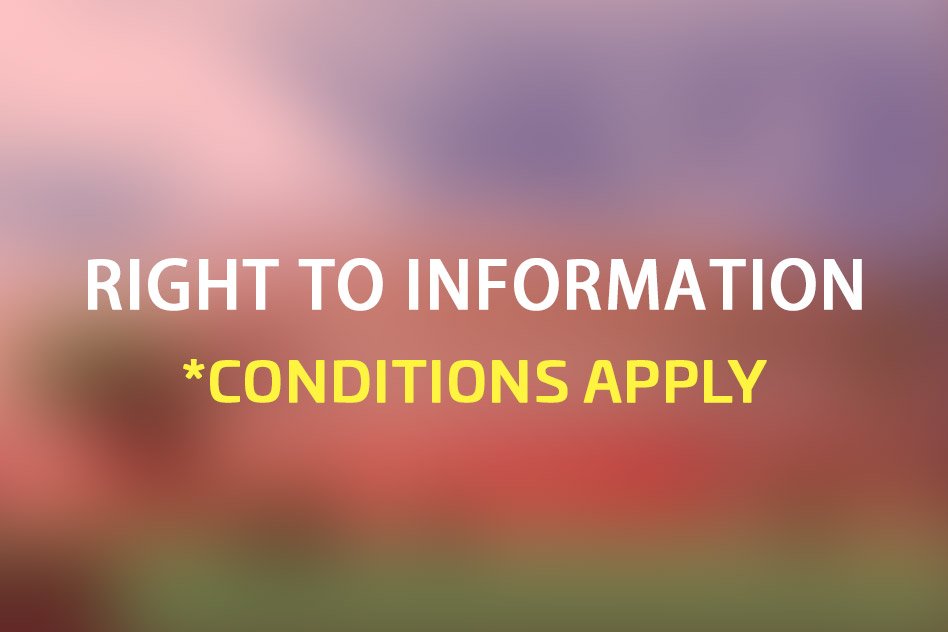
Govt To Change RTI Rules, Seeks Citizens' Opinions
3 April 2017 12:36 PM GMT
Editor : Sudhanva Shetty Shetty
Writer, coffee-addict, likes folk music & long walks in the rain. Firmly believes that there's nothing more important in a democracy than a well-informed electorate.
“The intention is clear. The government wants to make getting information difficult as the draft rules empower public authorities more than citizens.” – RTI activist Lokesh Batra.
A proposal for amending the RTI process is under consideration by the government. These proposed rules (the RTI Rules, 2017) have been placed by the Department of Personnel & Training (DoPT).
If approved, the new rules would replace the RTI Rules, 2012.
The full text of the proposed changes can be read here.
It must be noted that many sections of the media incorrectly reported that certain proposals were introduced only this year by the current government. Many of these proposals date back to 2012 and 2014.
RTI activist Subhash Chandra Agarwal told The Logical Indian, “There is a misconception in sections of the media that the word limit of 500 is being imposed and imposed now. It was introduced in 2012 itself by the previous government. This is not something new.” He also proposed additional changes, which can be read here.
The Government wants your views
The Government has decided to invite the views and suggestions of the public – of you – before debating over whether the new rules should be implemented.
Public suggestions can be sent by 15 April 2017 through e-mail to Ms Preeti Khanna, Under Secretary (RTI), North Block, at the email ID [email protected]
Key documents
The RTI Rules, 2012;
The RTI Rules, 2017.
What do the proposals aim to do?
The proposed rules have been uploaded on the DoPT website for comments from the public.
The new rules are numerous; however, the most significant among them are the following:
- A fee will be levied on an application as notified by the Central Government from time to time;
- An application should not contain more than five hundred words;
- The applicant will bear the postage charge for sending the information sought (currently, the government takes care of the bill);
- Appeals will have to be filed online;
- The applicant must send a copy of an appeal to the information officer, a job which is currently the responsibility of the official or the department concerned. If the applicant fails to do this, the appeal can be rejected.
- Government publications such as the economic survey and National Sample Survey Office data will be costlier; applicants will have to pay double the present rate for these documents.
- The Rules add definitions and provisions to many RTI-related designations and provisions.
Which are the rules you might want to write against?
If you are a citizen deeply concerned about this country’s democracy and passionate about transparent governance, you should voice your opposition to some of the rules loudly and urgently to the Government so that it does not implement them recklessly.
The proposed changes have several features. Let us, for the sake of brevity, focus on the four most significant draft rules:
- A fee will be levied on an application as notified by the Central Government from time to time: Currently, the price for filing an RTI is Rs 10. Some activists say the 2017 Rules could increase the price to Rs 50.
- An application should not contain more than five hundred words: This Rule was introduced back in 2012 itself. An application crossing 500 words is not encouraged, but this cannot be used as reason reject an RTI application.
- The applicant will bear the postage charge for sending the information sought: Currently, the government takes care of the bill.
- Appeals will have to be filed online: This could negatively affect those Indians without access to the internet or those who are internet illiterate. Currently, the number of web users in India is around 350 million, less than a third of the population. Even among this demographic, the number of internet-adept people is questionable.
Whom should you address your opinions to?
Any suggestions that you might have should be sent by 15 April 2017 through e-mail to Ms Preeti Khanna, Under Secretary (RTI), North Block, at the email ID [email protected].
Read more:
 All section
All section













